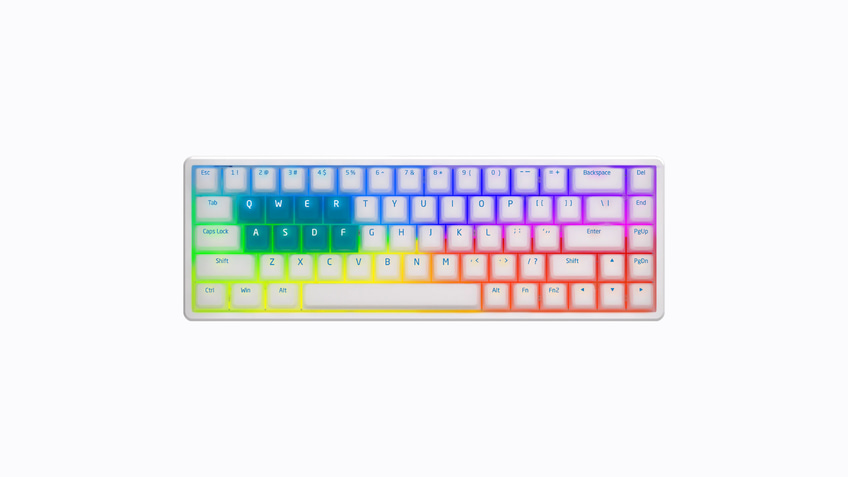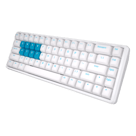Introduction
Lamzu is a brand that will ring a bell with most mouse aficionados at this point in time. After releasing some absolutely fantastic products in that space (see our Lamzu x Fnatic Thorn review, for example) they are now trying to win over the gaming keyboard crowd. In our full Lamzu Atlantis Pro Keyboard review, our reviewer will put the brand’s first effort to the test to see if it lives up to the standards that Lamzu gaming mice achieve. Read on to find out everything you need to know!
At A Glance
Lamzu Atlantis Pro Keyboard
Used by 1 player ()It’s a great addition to today’s ever-growing world of analog gaming keyboards, but it’s far from the only dog in the race. Whether it’s the winner for you will come down to a couple of subjective aspects.
Pros
- Fantastic build quality
- Unique design
- Backplate design is a great extra
- Switches and stabilizers feel nice to use
- Hall Effect switches are great for gaming
Cons
- Rubber keycaps are more difficult to keep clean and looking pristine
- Software can be clunky and feels unfinished at times
- Not all custom cables fit on this keyboard
Specs
| Form Factor | 65% |
|---|---|
| Switches | Raesha Magnetic Switches |
| PCB | Hotswappable |
| RGB | Yes |
| Height | 3.6cm |
| Width | 31.8cm |
| Length | 10.9cm |
| Weight | 1250g |
First Impressions
It has to be said that Lamzu do everything they can to impress their customers. The Lamzu Atlantis Pro Keyboard is presented in a nice box with a ton of extras, and the board itself also looks fantastic.
The case is made out of aluminum, and the weight immediately adds to the premium feeling that you get from this keyboard. To top it off, Lamzu have also added a laser-etched artwork to the bottom of the case. This is something that you often see on higher-tier custom keyboards so it’s cool to have it on a (relatively) affordable keyboard such as this one.
All in all, the Lamzu Atlantis Pro Keyboard makes a fantastic first impression. The choice to go for a baby blue color as an accent color might not sit well with everyone, but I feel like it suits the overall ‘dreamy’ aesthetic of the keyboard.
RGB
Due to the silicone keycaps with a solid top (more on those later) the RGB lighting that’s found underneath each switch looks very unique when turned on. Instead of the usual ‘light up letters with an underglow’ that you get with most RGB gaming keyboards, I think of a cloud-like sensation when I activate the lights on the Lamzu Atlantis Pro Keyboard.
Whether that’s something you like or not comes down to your personal preferences, but if you’re into dreamy aesthetics this should be a straight hit.
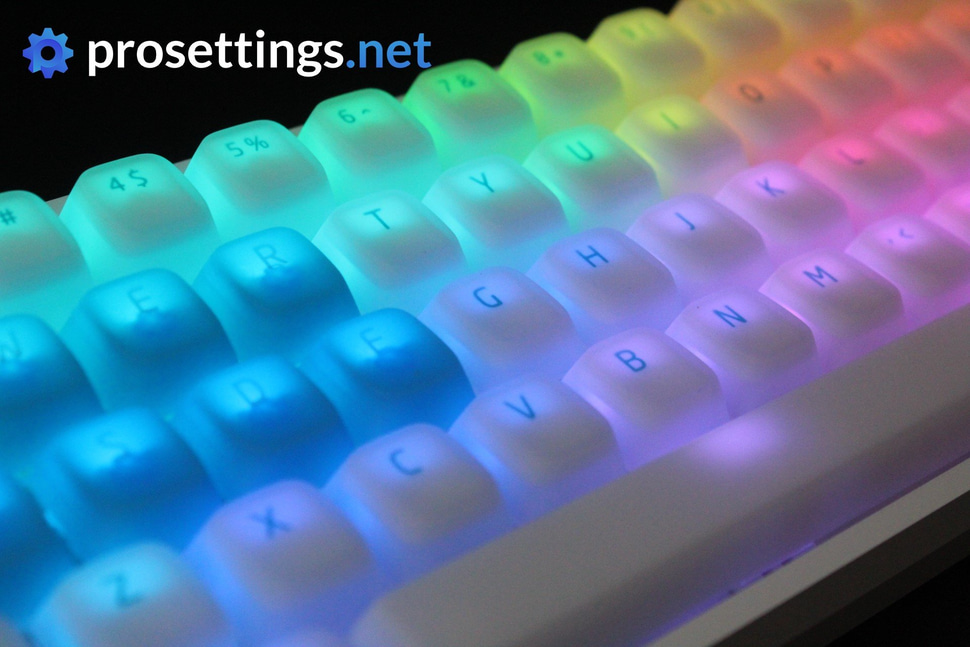
Packaging
Inside the box of the Lamzu Atlantis Pro Keyboard, you will find:
- The keyboard
- Spare white keycaps for the QWERASDF keys
- Keycap/switch puller
- Silicon pads for the spacebar
- Extra switches
- USB-C connection cable
- Carrying bag
- Quickstart guide/user documentation
All of this is presented in a nice and sturdy box. Lamzu clearly go the extra mile to make the whole unboxing experience feel fantastic, and I can appreciate those kinds of things. The bag is also a nice extra to keep the board clean when traveling to and from LAN events and the likes.
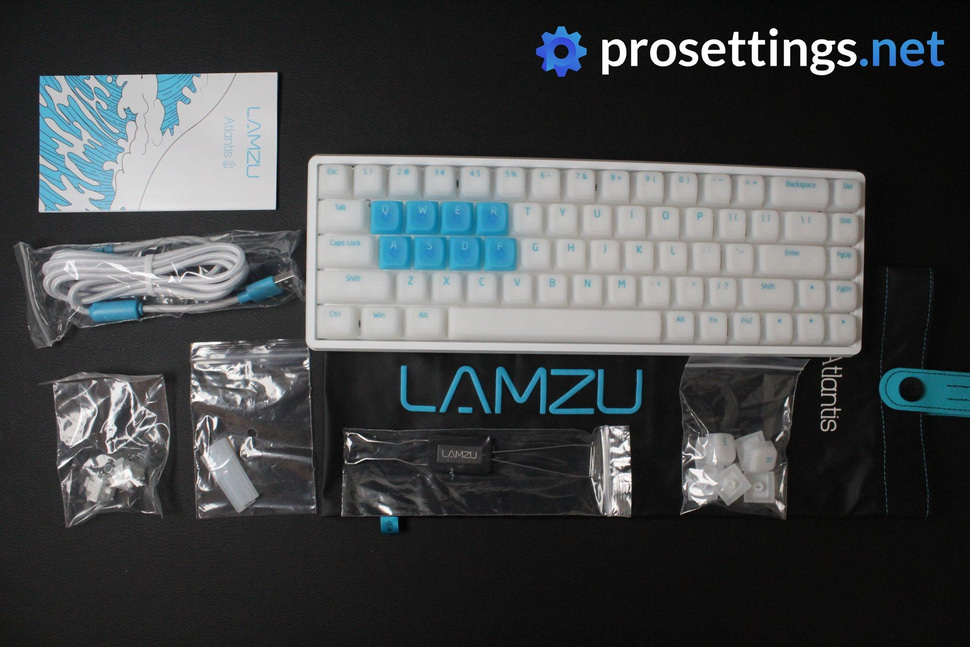
Features and Build Quality
Materials and Overall Quality
The Lamzu Atlantis Pro Keyboard feels fantastic. The case is made out of aluminum, and the quality here is high. There are no sharp edges or uneven sections on my copy, and the overall finish looks and feels consistent.
Being made entirely out of aluminum (with an aluminum switch plate to boot) this is of course a heavy board. Coming in at well over 1000 grams it’s not something that’s going to be extremely portable, but that’s a tradeoff that you have to make if you want to go for an aluminum case. I love sturdy and weighty cases for keyboards, but if you’re someone who is often taking their board on the road you might want to look towards something that’s a little lighter.
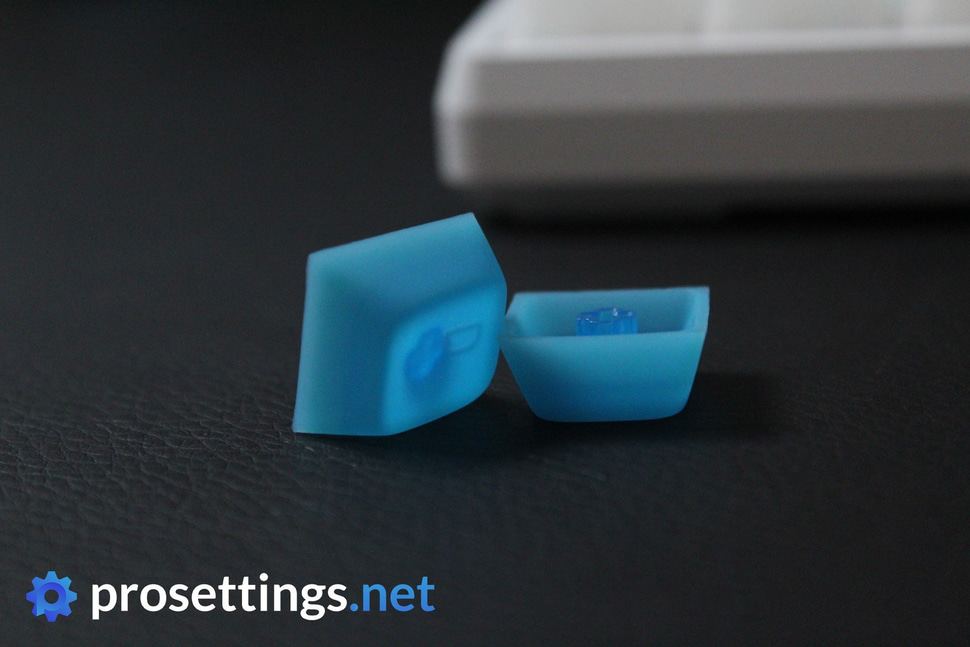
On the bottom of the keyboard are four rubber feet that do a fine job at keeping the board exactly where you placed it. There are no flip-up feet, however, so people who like to adjust their typing angle should take note.
Something that I don’t like is the fact that the connector is recessed inside a rather narrow channel. This made it difficult to connect some of my custom/aftermarket USB-C cables. Most of them did fit after some maneuvering but if you’ve got a thick connector then that’s not going to work out at all.
Etched Bottom Plate
On the backside of the keyboard you will find a laser-etched mirror-finished plate with artwork depicting (or at least inspired by) The Great Wave off Kanagawa. This is beautifully done and gives the keyboard a very premium extra touch. The only bummer here is the fact that you don’t get to see it at all unless you pick the keyboard up.
There’s no room at the top of this 65% keyboard, but if they ever make a TKL board (see our keyboard size differences explained guide) or go for a different type of 65% layout with a blocker I’d love to see a small plate with a similar top quality etching somewhere on the front.

Keycaps
One of the more unique features of the Lamzu Atlantis Pro Keyboard is that it comes with silicone keycaps. The very top portion is made out of regular ABS that’s then covered with a thinner silicone shell. Rubber/silicone keycaps are a preference of course, but it’s definitely not something that I enjoy.
Sure, they’re grippier, but I’ve never had any ‘slippage issues’ on any gaming keyboard, unless I’m using some extremely subpar keycaps. For me personally, the silicone caps are not an active hindrance, but they also don’t do anything extra when gaming.
When typing, it’s a different story. I simply don’t like the feeling of silicone. I tend to slide my fingers across keys when typing, and I’ve had multiple instances where my finger ‘got stuck’ on the sticky silicone when moving to a different key, causing me to make a typo. Of course you could argue that that’s user error, but I personally don’t see the need for a full rubber/silicone keyboard.
One final reason why I dislike silicone for the keycaps is due to the fact that it’s extremely hard to keep the keyboard clean. Eyelashes, dust particles, and hairs all stick to these grippier keys, so if you’re someone who likes a clean-looking board this will get annoying over time. Doubly so because the keyboard is all white, meaning that dust and other unwelcome particles are a lot easier to spot.
I am fully aware of the fact that most of the above is subjective, but I would’ve loved to try a version of this board with some regular high quality PBT keycaps.
The caps themselves also have a different profile than most other keycaps on gaming keyboards. The tops of the keycaps are shaped like a ‘bowl’, whereas the keycaps on most other gaming keyboards are a lot flatter. This is something that takes some getting used to at first, but it does give you a slightly more ‘locked in’ feeling when gaming and typing.
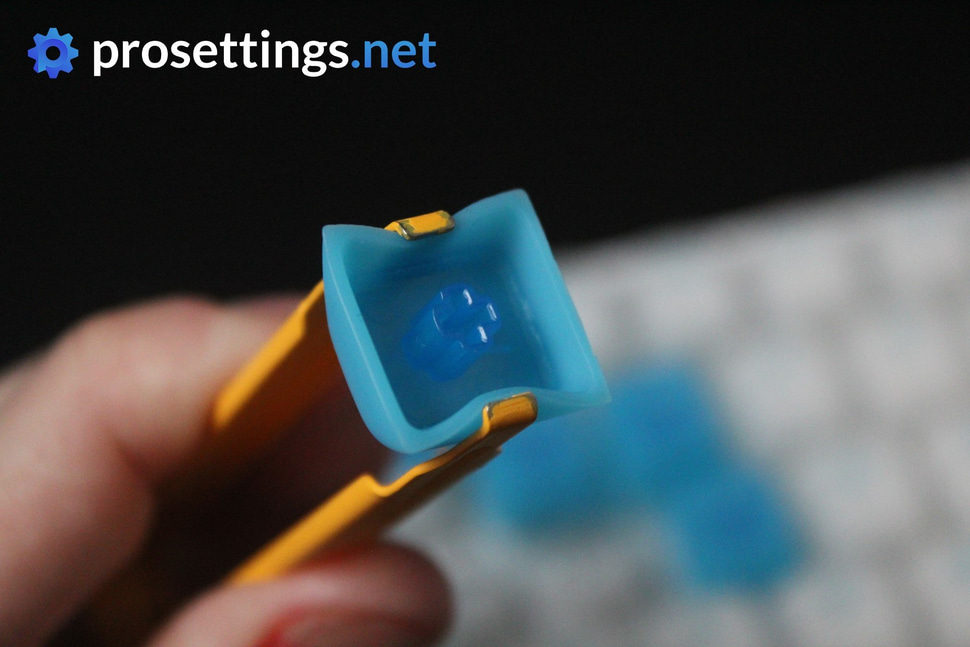
Customization
Customization of the board’s lighting and overall functionality is done through Lamzu’s Atlantis Pro Keyboard software. Despite the fact that this program works as it should most of the time, it does seem somewhat unfinished and confusing to use when compared to some of its peers. I also had one or two instances where the keyboard seemed to forget what settings I was using, and that can be quite annoying when you’re in the middle of a gaming night.
Despite this, you will find everything you need in the program itself. You can change the lighting, customize the behavior of the switches, rebind keys, and create macros.
Switches
Lamzu is using the Raesha Magnetic switches in the Atlantis Pro Keyboard. This is a magnetic switch, which means that you can customize its actuation point and activate features such as Rapid Trigger, where the actuation point immediately resets once you let go of the key. If you want to learn more about what makes these types of switches so much better for gaming I’d recommend you to read our brief introduction guide on analog switches in keyboards, but in short: magnetic/analog switches are the way forward for gaming keyboards.
These Raesha Magnetic switches come pre-lubed. That’s not always a surefire way to have great switches (unevenly applied lube can be worse than no lube at all) but here it all feels consistent and pleasant to use. The switches are smooth and they also sound pretty darn good for a mass-produced factory switch. I don’t personally see a need to further lube these, but your tolerances may differ of course.
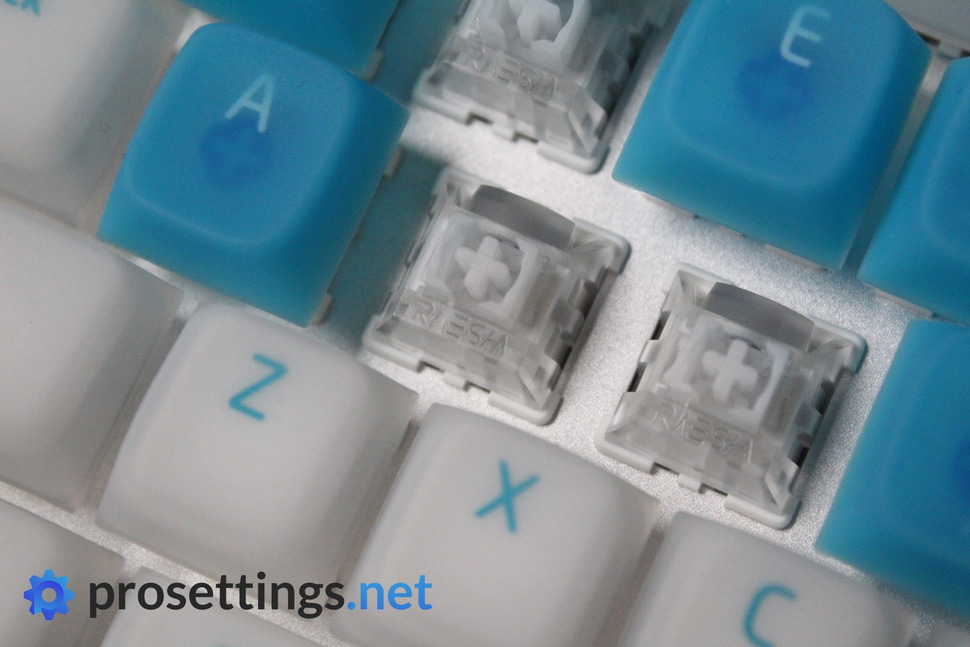
Typing and Gaming Experience
Gaming Experience
The main draw of this keyboard is of course its gaming performance. The fact that you can tweak each individual switch’s sensitivity to match your personal preferences already gives it a leg up over traditional mechanical keyboards, but it doesn’t end there. Features such as Rapid Trigger make a tremendous difference in movement-based games (or really any other game where precision is of the essence) and can definitely make counter-strafing a lot more consistent.
If you ask me, these types of switches are quite simply the way forward for gaming keyboards. I’ve used a number of different boards with analog switches at this point, and while they all have different characteristics and quirks, there’s one constant: they feel great for gaming. The same can be said for the Lamzu Atlantis Pro keyboard. Counter-strafing, going for very precise moves, or quite simply playing games where input timing matters a ton: it’s all a whole lot easier with boards like these. I know I won’t be going back to a regular keyboard for gaming ever again.
It’s one thing to slap some magnetic switches in your board, but it’s another thing to implement them properly, and Lamzu have done a great job here. During my testing I didn’t find any big inconsistencies in the Rapid Trigger implementation or the overall behavior of the switches. When it comes to overall precision and features the Wooting 60HE is still the benchmark, but the Lamzu Atlantis Pro comes so close in regular PC gaming scenarios that it’s going to be difficult to even tell the difference.
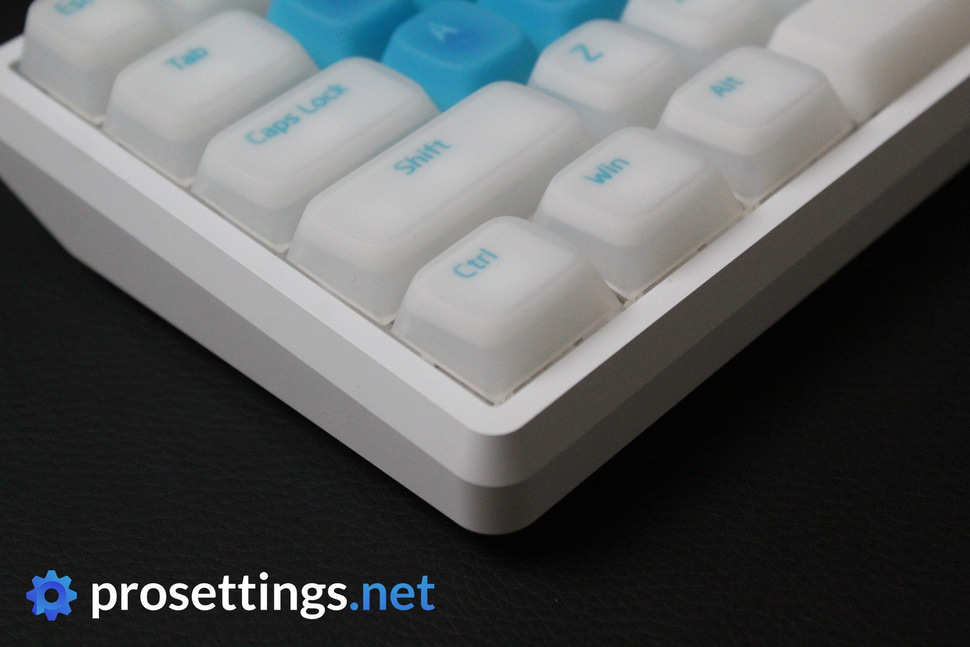
Stabilizers and Overall Typing Experience
The Lamzu Atlantis Pro Keyboard is playing in the top leagues (for mass-produced keyboards, that is) when it comes to the overall sound profile and the typing experience. The switches are evenly and consistently lubed, which makes them a pleasure to use. Combine that with case foam and a layer of silicone in between the PCB and the switch plate and you’ve got a keyboard that feels and sounds great.
Overall, this keyboard is a testament to how far mass-produced gaming keyboards have come. Just a year or three ago, a keyboard of this quality could only be achieved by building it yourself. Today, you can just buy it off the shelf without having to open it up and lube a bunch of switches and stabilizers.
It should be noted that this keyboard’s main draw is its gaming performance, however. If you’re not a gamer and/or you don’t really care about the gaming features that it offers there are options that you can buy that offer a better sound/feel for about the same money (or less) in this day and age.
Sound Test
Alternatives
Lamzu Atlantis Pro Keyboard vs Wooting 60HE
In a direct gaming comparison, the Wooting 60HE quite simply has more features that are more refined to boot. Wooting’s software experience is also a lot more intuitive and polished.
However, the Lamzu Atlantis Pro Keyboard does beat the Wooting 60HE in both build quality and typing/sound quality. The Wooting’s plastic case might be lighter than the aluminum case of the Lamzu Atlantis Pro Keyboard, but there’s no doubt that the latter looks and feels a lot more premium.
When deciding between the Wooting 60HE and the Lamzu Atlantis Pro Keyboard, it’s mainly a question of priorities if you ask me. If it’s mostly about the sound and feel, the Atlantis Pro Keyboard is the winner. If you want to get the best overall performance and a more polished software experience, the Wooting 60HE should be your choice.
Lamzu Atlantis Pro Keyboard vs SteelSeries Apex Pro
The Lamzu Atlantis Pro Keyboard sounds better and offers a better typing experience than the SteelSeries Apex Pro Line in my opinion. When it comes to the overall gaming performance, both are quite evenly matched, though the Apex Pro Mini has better software.
When it comes to deciding between these two, availability and price are probably going to be a major factor, though it’s also important to note that the Apex Pro does not have a hotswappable PCB and comes in a plastic case, making it a less premium and less durable option.
Read our SteelSeries Apex Pro Mini review
Conclusion
These days, pretty much all gaming keyboard manufacturers are coming out with analog keyboards that have customizable switches. It’s only logical that brands make an effort to get their products noticed, and Lamzu did exactly that with their premium case and silicon keycaps.
For me personally, only one of those two is a hit. I love the case and the way it’s finished, but I just don’t see a need for a keyboard with a fully silicone set of keycaps. If you do happen to love silicone keycaps (or you’re willing to swap them out) and you’re looking for a high quality keyboard with a strong focus on gaming, this could very well be it.
The Lamzu Atlantis Pro Keyboard has a great sound and typing experience straight out of the box, and the adjustable switches inside of it perform up to with what you’d expect in today’s market. It’s a great addition to today’s ever-growing world of analog gaming keyboards, but it’s far from the only dog in the race. Whether it’s the winner for you will come down to a couple of subjective aspects.
You can learn more about the Lamzu Atlantis Pro Keyboard on Lamzu’s website.
This product was received for free from the manufacturer and given to our reviewer to test and review. Brands and manufacturers have no editorial control over our reviews. For more information, check out our review FAQ.


